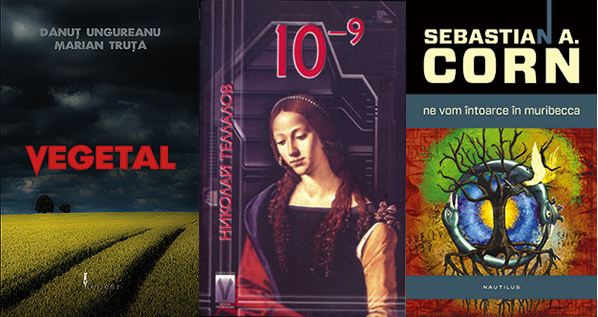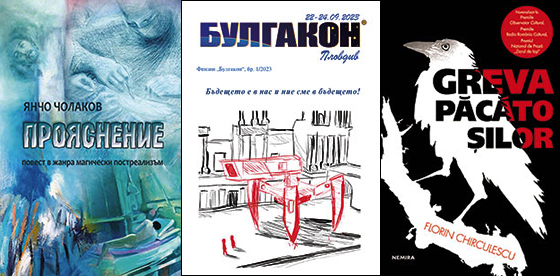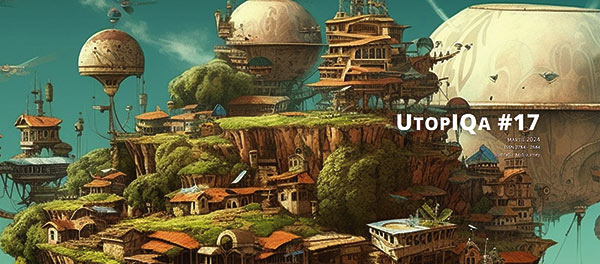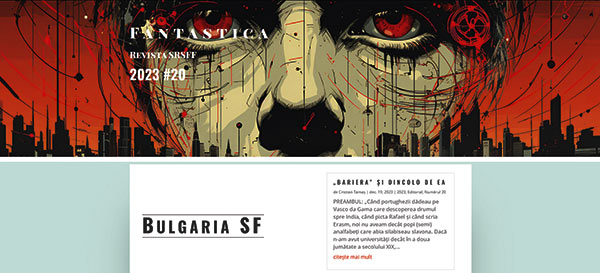SF in Bulgaria & Romania: How Many Dwarfs Does It Take to Match a Giant? by Valentin D. Ivanov & Cristian Tamaș
Outside of the vast English-speaking fandom lies a tapestry of diverse and weakly interlinked communities from the countries with small language bases. These languages, and the nations that speak them are often – because of inertia, rather than ill intent – perceived as “minor.” Indeed, they are minor in one critical aspect: as literary markets. This circumstance has a profound effect on their literature. Speculative fiction, with sales an order of magnitude smaller with respect to the mainstream, suffers even more from this disadvantage of scale.
These were the topics that a group of Bulgarian and Romanian fans discussed during a nearly two-hour long online meeting in mid-February, on the very same day Iain M. Banks would have turned 70. The gathering was the doing of Cristian Tamaș, a SF fan and promoter from Romania, from the Romanian Science Fiction & Fantasy Society, editor of Fantastica.ro and anchor of the ProspectArt online SF club (<dsc.gg/prospectart>). The online format started during the COVID pandemic, and continues for the obvious convenience of getting together people that are geographically far away.
Two Bulgarian guests took part in the event, Elena Pavlova and Valentin D. Ivanov. Pavlova is an established multifaceted writer who has authored fantasy, horror, and SF books. Her short fiction has appeared in Asimov SF, Samovar, Future Science Fiction, and Compelling Science Fiction. She is a recipient of many national and international accolades, including a Eurocon award in the children’s category for the novel An Adventure in the Lower Earth. Christmas Carolers Versus Hallus Beasts appeared in 2021. Ivanov is a scientist, fan, promoter, and writer known also for his popular-astronomy articles. His non-fiction can be found in Strange Horizons, Analog, and in the book Letters to Tiptree. On the Romanian side, Cristian Tamaș, Sorin Camner, Cristian Vicol, Cristina Ghidoveanu, and Sorin Boboutanu took part in the discussion.
There were a few people at the meeting, in total fewer than ten. This number is not too different from the audience at some of the SFF society meetings in our countries. The event started with Valentin offering a short review of the origin, history, and current state of the Bulgarian speculative fiction and fandom. Not surprisingly, the speculative genre is rooted in the country’s folklore; surprisingly, the name of Ivan Vazov (1850-1921), a well-known mainstream author, keeps coming up when the first genre prose and poetry works are listed. The first exclusively genre publisher, Argus, was established more than a century ago in 1922 by Svetoslav Minkov (1902-1966), known for his diabolical writing. Today the SF conventions typically gather around a hundred attendees. After this introduction, Elena read a story of hers, appropriately set near the Danube river that defines most of the border between the two countries. Cristian was quick to point out that rivers also connect people.
We were practically strangers – Bulgarians and Romanians who had never met in person, although we knew each other from virtual events. Still, the love of the speculative genre brought us together to discuss ways to help each other. Yet the very first conclusion we could draw from our conversation was about the similar nature of our problems. The fandoms in our countries face the same challenges: speculative fiction is isolated from the main literary scene, and is looked down upon by many critics, publishers, and even readers. Furthermore, the book markets in both our countries are swamped with English translations, and even though many of them are excellent literature, this leaves little room for the native authors, because today in Bulgaria and Romania, books are luxury goods that few people can afford. Similarly, the shortchanged libraries that rely on government funding can seldom afford to buy “niche” speculative fiction.
Two strategies emerged in the efforts to further the standing of genre literature in our countries. The first was to try expanding the exchange across borders with the neighboring countries. Separately, we are minuscule markets, dwarfs with respect to the giant English market, but there are many of us. It quickly became apparent that the typical print runs for native speculative fiction in both our countries are in the hundreds. Alas, even adding the market shares together is not going to change the disparity with the English-language authors that exists on both sides of Danube. The participants concluded that the deeper problem was the bias that seems to be common among the Bulgarian and Romanian cultures that the “imported stuff is always better,” in a striking contrast with the American “not invented here” syndrome. The origin of this prejudiced opinion can be traced to the history – also largely shared – of our countries, including, but not limited to, long stretches of independence loss and many devastating wars, so typical of the Balkans, plus the string of corrupt governments that never thought of supporting culture. This support doesn’t have to be financial, and, in fact, the best is to lead by example – the reading lists of the American ex-president Barack Obama come to mind, which did include some notable genre fiction novels.
Elena Pavlova put forth an alternative strategy: turn to the young readers, and succeed first in the worldwide, meaning English, market. The first is an obvious way to extend the reader base into the next generation, and the second is culture-specific: recognition abroad is a trusted quality-assurance stamp in our countries. It is not a new idea, and the subsequent discussion brought up some examples, including for writers from Western countries like Denmark – otherwise prosperous but with just as limited a language base as Bulgaria or Romania – who started to get published in their native country only after a breakthrough in the USA or UK. This strategy has been pursued by the Human Library Foundation, an organization of Bulgarian enthusiasts that was established more than a decade ago by the notable fan and promoter Kalin M. Nenov. It facilitated, through translation and representation, the English language publications of a few stories – a small number, still, but hopefully setting a trend. Both Bulgarians at the event were part of this group at one time or another.
In hindsight, the “solutions” we arrived at were more or less obvious: This and the previous meetings between us embodied the “crossing the border” idea, young adult speculative fiction is not so rare, and besides the problems, we shared the English language that most of us spoke as a second or third language. Thanks to some pro bono efforts by Cristian Tamaș and other Romanian fans like Sorin Camner, Cristian Vicol, Cristina Ghidoveanu, and Sorin Boboutanu, a few Bulgarian works of fiction have appeared in Romanian online fanzines, and similarly some Romanian non-fiction was included in the bilingual (in Bulgarian and English) Bulgacon e-zine, associated with the Bulgarian xnational speculative fiction conventions in 2022-23. These exchanges will surely continue and all participants at the gathering hoped – and would surely make the necessary efforts – to turn these joint events into a tradition. On the other hand, despite the few successes, breaking into the English-speaking market has proven more challenging, and will require sustained long-term efforts on a national levels, because Romanian and Bulgarian are not such similar languages, after all.
Attentive readers may have noticed the careful choice of words in the title. The speculative fiction communities of “minor” countries do not want to fight the giants. We aspire to become a giant ourselves, albeit multifaceted, multilingual, and multicultural, by means of teamwork and cooperation.
Here is a list of notable genre fiction from Bulgaria and Romania that is not available in English, in alphabetical order:
10-9 (also known as Nano/”Нано”; Bulgaria, 2008) by Nikolay Tellalov paints the difficult transition toward singularity. Much like in the famous Strugatsky novel, some people embrace the change and switch to fast-forward mode, while others cling to the escaping past by all means.
Asen and the Travellers Across 101 Bulgarias (Асен и пътешествениците в 101 Българии, Bulgaria, 2020) by Elena Pavlova is a young-adult novel about cross-world traveling kids. They find themselves in various alternative histories – some worse, others better than our own – and pick up a lot of life-changing experiences while being forced to mature quickly along the way.
Revelation (Прояснение, Bulgaria, 2019) by Yancho Cholakov is a literary speculative fiction that takes a deep, questioning look at reality, much like Philip K. Dick does in his books. It is a story of modern shamanism, masked as a medical thriller.
In The Strike of Sinners or the Apocrypha of a Jew (Greva păcătoșilor sau apocrifa unui evreu, Romania, 2017) by Florin Chirculescu, ancient history meets recent history, facts and times mix, identities are made and undone, and fiction encompasses everything. A polyphonic SF novel in which the Romanian present, synonymous with crisis and corruption, combines with the oriental past and the beginnings of modern medicine, The Strike takes its readers through labyrinths with no exit, challenging them to an unsettling reading and to the discovery of their own ways.
Vegetal (Romania, 2014) and Mineral (Romania, 2015) form a SF duology by Dănuț Ungureanu & Marian Truță: postapocalyptic SF, suggesting the directions and equivalences of other readings, books that mimic the style of adventure novels, books that use the fantastic as a mark, and humanity has no choice but to reinvent itself in order to survive as a collective entity.
In We will return to Muribecca (Ne vom întoarce în Muribecca, Romania, 2014) by Sebastian A. Corn (a pen name of Florin Chirculescu), time and space multiply and characters and stories mix in a book that defies genres and literary conventions, and provides an opportunity to confront communism and capitalism, consumerism and morality.
–Valentin D. Ivanov & Cristian Tamaș
This report and more like it in the June 2024 issue of Locus..
 While you are here, please take a moment to support Locus with a one-time or recurring donation. We rely on reader donations to keep the magazine and site going, and would like to keep the site paywall free, but WE NEED YOUR FINANCIAL SUPPORT to continue quality coverage of the science fiction and fantasy field.
While you are here, please take a moment to support Locus with a one-time or recurring donation. We rely on reader donations to keep the magazine and site going, and would like to keep the site paywall free, but WE NEED YOUR FINANCIAL SUPPORT to continue quality coverage of the science fiction and fantasy field.












